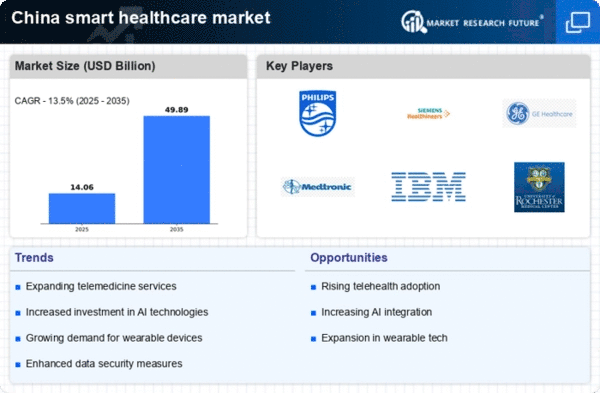Government Initiatives and Funding
Government initiatives and funding play a significant role in propelling the smart healthcare market. The Chinese government has been actively investing in healthcare technology, with a budget allocation of over $100 billion for health-related projects in recent years. This funding supports the development of smart healthcare solutions, including electronic health records and integrated health information systems. Furthermore, policies aimed at enhancing healthcare accessibility and quality are being implemented, which encourages the adoption of innovative technologies. The smart healthcare market is likely to benefit from these initiatives, as they create a conducive environment for startups and established companies to innovate and expand their offerings. The government's commitment to improving healthcare infrastructure is expected to drive market growth, potentially increasing the market size by 30% over the next five years.
Growing Health Awareness Among Consumers
The growing health awareness among consumers is a crucial driver for the smart healthcare market. As individuals in China become more health-conscious, there is an increasing demand for personalized health solutions and preventive care. This trend is reflected in the rising sales of health-related apps and wearable devices, which are expected to grow by 40% in the next few years. Consumers are actively seeking tools that provide insights into their health metrics, leading to a surge in the adoption of smart healthcare technologies. This heightened awareness not only encourages individuals to take charge of their health but also drives healthcare providers to innovate and offer tailored solutions. The smart healthcare market is likely to expand as a result of this consumer-driven demand, fostering a culture of proactive health management.
Rising Demand for Remote Patient Monitoring
The increasing demand for remote patient monitoring is a pivotal driver in the smart healthcare market. As healthcare systems in China evolve, there is a notable shift towards managing chronic diseases and post-operative care remotely. This trend is fueled by the growing aging population, which is projected to reach 400 million by 2040. Remote monitoring technologies enable healthcare providers to track patients' vital signs in real-time, reducing hospital visits and enhancing patient engagement. The smart healthcare market is expected to witness a growth rate of approximately 25% annually, driven by innovations in telehealth solutions and wearable devices that facilitate continuous health monitoring. This shift not only improves patient outcomes but also alleviates the burden on healthcare facilities, making it a crucial aspect of the smart healthcare market.
Integration of Artificial Intelligence in Healthcare
The integration of artificial intelligence (AI) in healthcare is transforming the smart healthcare market. AI technologies are being utilized for predictive analytics, personalized medicine, and operational efficiency. In China, AI applications in healthcare are projected to reach a market value of $6 billion by 2025. This growth is attributed to advancements in machine learning algorithms and data analytics, which enhance diagnostic accuracy and treatment outcomes. Hospitals and clinics are increasingly adopting AI-driven solutions to streamline processes, reduce costs, and improve patient care. The smart healthcare market is likely to see a surge in AI-based applications, as healthcare providers recognize the potential of AI to revolutionize patient management and clinical decision-making. This trend indicates a shift towards more data-driven healthcare practices, which could reshape the landscape of the industry.
Advancements in Internet of Things (IoT) Technologies
Advancements in Internet of Things (IoT) technologies are significantly influencing the smart healthcare market. The proliferation of connected devices enables seamless communication between patients and healthcare providers, facilitating real-time data exchange. In China, the IoT healthcare market is projected to reach $20 billion by 2026, driven by the increasing adoption of smart devices and sensors. These technologies enhance patient monitoring, medication adherence, and chronic disease management, thereby improving overall healthcare delivery. The integration of IoT in healthcare systems allows for more efficient resource allocation and better patient outcomes. As the smart healthcare market continues to evolve, the role of IoT technologies is expected to expand, potentially leading to innovative solutions that address the complexities of modern healthcare.
















